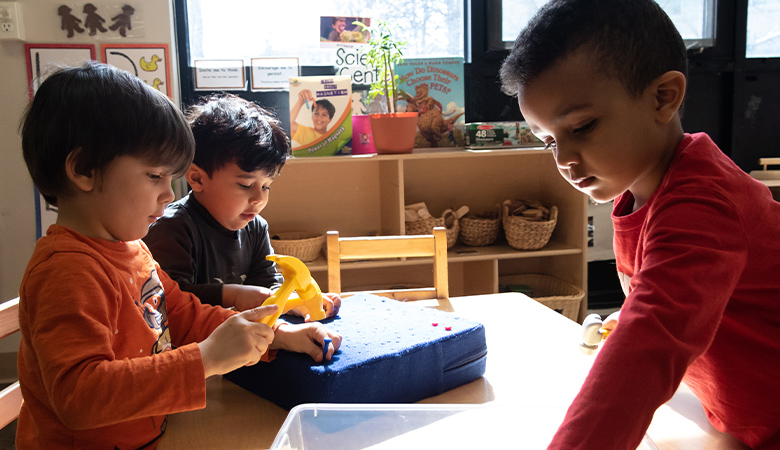
Challenge
The first 10 years of a child’s life are a critical developmental period that impacts all that follows. During these years, opportunity and achievement gaps begin early for the millions of U.S. children who live in families with low or below poverty-level incomes. Research shows that investing in early childhood education (ECE) and comprehensive servcies for these children has long-term benefits. Yet the disjointed patchwork of education, health, and social services programs in the United States leaves far too many children vulnerable and at risk.
Nationwide, EDC’s First 10 initiative supports community partnerships in creating pathways out of poverty for young children and their families. First 10 brings together elementary schools, early childhood programs, community organizations, and health and social services agencies to dramatically improve the well-being, school readiness, and school success of children.
Key Activities
First 10 provides community partnerships with the guidance and continuous improvement tools they need to ensure all children thrive. Current activities include:
- Partner with communities to design plans to apply and sustain the four First 10 strategies:
- Support professional collaboration to improve teaching and learning
- Coordinate comprehensive services for children and families
- Promote culturally responsive partnerships with families
- Provide strategic leadership and ongoing assessment
- Support a network of First 10 sites to facilitate peer learning
- Study and raise awareness of innovative communities’ successes using the First 10 approach
- Develop and share practical guidance on how to use the First 10 approach
Impact
- First 10 communities partnerships are improving outcomes for thousands of children and families.
- A 2023 evaluation study conducted by AIR found that, among other positive outcomes, sites in a Michigan pilot of First 10:
- Addressed barriers that limit families’ access to school readiness services
- Increased collaboration between pre-K and kindergarten teachers
- Aligned pre-K and kindergarten practices
- Raised awareness of the importance of early learning through Parenting Campaigns
- Improved collaboration among schools, early childhood programs, and community partners
- A 2024 evaluation of First 10 in Rhode Island found that:
- The initiative successfully improved transition to kindergarten practices and strengthened partnerships with families.
- Each community established robust cross-agency partnerships that implemented First 10 strategies.
- First 10’s core strategies gradually became institutionalized into ongoing community activities.
- The First 10 initiative has shared its findings on the approach’s success, including the following:
- First 10 Introductory Video: School Leader Perspectives
- Helping All Children Succeed from Their Earliest Days (video)
- The Power of First 10 Partnerships (Early Learning Nation)
- A game-changing opportunity: Rethinking how communities serve children and families (Yale School of Medicine)
- Head Start School-Community Partnerships Create Change (National Head Start Association)
- Building State and Local Systems in Tandem (New America and EDC)
- Four Strategies for Getting the First 10 Years of a Child’s Life Right (Education Week)
- All Children Learn and Thrive: Building First 10 Schools and Communities
- A Purple Agenda for (Early) Education (Education Week)
Learn More
PROJECT DIRECTOR
